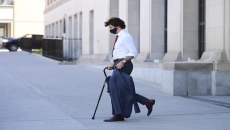A new study suggests Canada has vastly underestimated how many people have died from COVID-19 and says the number could be two times higher than reported.
Dr. Tara Moriarty, working group lead for the study commissioned by the Royal Society of Canada, said in an interview while most accounts have put the majority of deaths in long-term care, the new data analysis suggests the toll of COVID-19 was also heavily felt outside the homes in the community.
Many of those deaths likely occurred in lower income, racialized communities and affected essential workers, new immigrants and people living in multigenerational homes, as well as clinically frail seniors living at home, the study says.
"If we'd had some sense early on of who was dying where, if we had had a sense of just how many deaths were actually occurring ... maybe people would have started looking sooner or listening sooner to people in communities who were saying, 'It's really really bad here, people are dying,'" Moriarty said.
"It might have provided support for those claims that might have caused some kind of action that would have saved lives."
Moriarty said seeing Canada out of step with similar high-income countries on the proportion of long-term care deaths was a red flag that inspired the analysis by the society.
The new peer-reviewed analysis casts doubt on the widely accepted assumption that 80 per cent of Canada's deaths due to COVID-19 occurred among older adult residents of long-term care homes.
Instead, it says at least two-thirds of deaths caused by COVID-19 in communities outside of long-term care may have been missed. That would put the proportion of deaths in long-term care at around 45 per cent, much closer to the average of 40 per cent reported by peer countries in the Organization for Economic Co-operation and Development.
The conclusion is based on a review of reports of excess deaths across Canada, the pattern of COVID-19 fatalities during the pandemic and cremation data showing a significant spike in deaths at homes versus hospitals in 2020. It also relies on antibody surveillance testing that collectively unmasked the likely broad scope of undetected COVID-19 infections.
The researchers adjusted the data to account for things like increased deaths due to the drug toxicity crisis and the expected drop in deaths linked to the pandemic because of things like reduced traffic accident rates.
The extent of "likely missed" fatalities varies by province and there are major data gaps in what was available, Moriarty said.
The knowledge gap is particularly acute in British Columbia, Saskatchewan, and Manitoba where cause-of-death data is only complete into February 2020, the report says. It was less of a problem in Quebec, where the virus accounted for all excess deaths, and Ontario.
Between Feb. 1 and Nov. 28, 2020, the study found COVID-19 deaths of about 6,000 people aged 45 and older appeared to have gone undetected, unreported or unattributed to the virus.
"This suggests that if Canada has continued to miss these fatalities at the same rate since last November, the pandemic mortality burden may be two times higher than reported," the report says.
Eemaan Kaur Thind, a public health practitioner who looked at both detected and undetected COVID-19 deaths in racialized communities, said the results weren't a shock given previous reports linking the communities and deaths or hospitalization rates.
The study suggests it's likely many cases in those communities were never identified, and the resulting deaths were never counted.
"We know that a high-proportion of essential workers happen to be visible minorities," she said.
"None of that surprised me, although it never really becomes any less hard to see the official numbers when you see something like this."
Thind said she hopes the findings push policy-makers to listen to those most affected, many of whom raised alarms about things like the role language barriers played in access to COVID-19 testing and care.
"Data is very important but I think it's more important to also listen to people and believe them."
About 25 per cent of likely deaths occurred in people between 45 and 64, the study said.
The researchers make several recommendations, including mandating weekly preliminary reporting of deaths due to all causes to Statistics Canada, performing COVID-19 testing on all people who die in any setting, and immediately adopting methods used by the U.S. Centers for Disease Control for estimating excess mortality during the pandemic.
The group also calls for the creation of a national COVID-19 mortality task force with the provinces and territories, and independent advisers to investigate why so many Canadian COVID-19 cases and deaths have been missed or unreported, including examining demographic and employment data for those who died.






